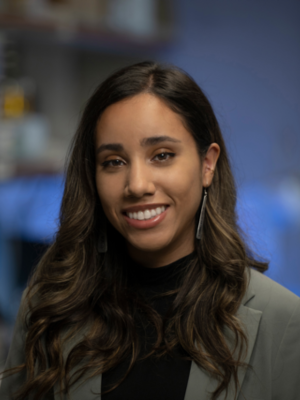Jacobs School of Engineering
- Alyssa Chiang
- Nicole E. Félix Vélez
- Nishta Krishnan
- Nathaniel Linden-Santangeli
- Carlos Munoz
- Maya Rowell
- Sai Zhou
 Tell us a bit about your background:
Tell us a bit about your background:
I was born and raised on the beautiful west coast of Puerto Rico, where I did two years of undergrad at the University of Puerto Rico, Mayagüez. I ended up transferring to Cornell University in 2018 and graduated with a B.S. in Biological Engineering in 2021. During my undergrad, I sought out as many opportunities as possible to try research and I was fortunate enough to participate in various summer research opportunities for undergraduates. At Cornell, I found a passion for research involving precision medicine -- the clinical practice that seeks to develop patient-tailored therapies. It was then that I knew I wanted to continue pursuing this area of research and help develop personalized therapies for patients. Aside from research, I am passionate about teaching and mentoring at the high school and undergraduate levels, particularly students from underrepresented groups in STEM. I ended up transferring colleges in undergrad because I experienced firsthand how students in big and well-known universities in the US had easy access to opportunities to pursue research and develop key skills for their careers while others struggled to find these same opportunities. My goal is to support underrepresented students throughout their careers by providing them the tools, mentorship, and suppport they need to succeed in a career in STEM and pursue higher education.
What are you studying/researching?
I work in the Aguado iBiomaterials Lab in the Department of Bioengineering where we develop biomaterials to investigate sex differences in cardiovascular disease. Often, we think medicine is a "one-size-fits-all" approach, when in reality, male and female patients respond very differently to medical treatments and often exhibit different clinical presentations. In the case of aortic valve stenosis (AVS) -- a heart valve disease in which the aortic valve stiffens over time due to fibrotic scarring and/or calcification of the tissue -- female patients are underdiagnosed and undertreated due to the current clinical requirements for diagnosis and treatment being based on male patients. Essentially, we want to understand why female patients exhibit increased fibrosis in the aortic valve, while male patients have more calcification.
If you would like to see what Nicole is up to, you can follow her twitter: @nicoleefv
Tell me a little bit about your campus involvement at UC San Diego.
I've been heavily involved in the Bioengineering Graduate Society (BEGS) since I started here in 2021. Graduate school can be difficult, and without resources and community support, it becomes even harder. I love working with other graduate students to provide support to one another through mentoring and advocacy. As a member of the BEGS executive board, we strive to provide students within Engineering the tools and resources they need to succeed in their graduate career and beyond -- whether that's through professional development workshops, networking opportunities, academic assistance, or DEI support. I also really enjoy working with undergraduate students at UC San Diego. I have been a mentor to various bioengineering undergraduate students that want to pursue graduate school through a BEGS initiative, and enjoyed my time TA'ing for BENG 168: Biomolecular Engineering!
Why UC San Diego?
Two words: Grad students. Academia can often feel very competitive and isolating, and when I was looking for graduate programs to join, I really wanted to be in a place where I would feel like a part of a community and have the support of others. The graduate students here are the most welcoming and supportive people I have met in academia. It's hard to find a top research university where the students are successful researchers but also take time to enjoy their lives! (And you can't beat the weather! Grad school gets tough and it's better to reflect on your failed experiments sitting by the beach than trekking through a mountain of snow!)
Have you been awarded any fellowships or grants during graduate school? If so, which ones?
I am an NSF Graduate Research Fellow and a National Heart, Lung, and Blood Institute (NHLBI) Diversity Supplement Scholar. I was also awarded the 2023 GEMINI Fellowship from the Institute of Engineering in Medicine at UC San Diego. I am very fortunate to have great mentors that support me throughout my career and encourage me to apply to these opportunities.